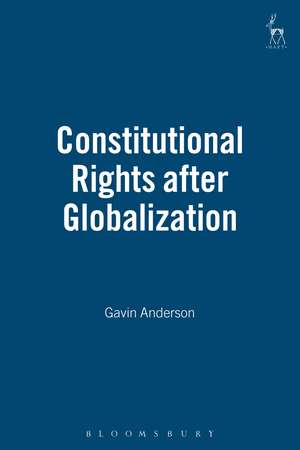Constitutional Rights after Globalization
Autor Gavin Andersonen Limba Engleză Hardback – 10 mai 2005
Preț: 496.14 lei
Preț vechi: 687.77 lei
-28% Nou
Puncte Express: 744
Preț estimativ în valută:
94.93€ • 99.13$ • 78.39£
94.93€ • 99.13$ • 78.39£
Carte tipărită la comandă
Livrare economică 15-29 aprilie
Preluare comenzi: 021 569.72.76
Specificații
ISBN-13: 9781841134482
ISBN-10: 1841134481
Pagini: 176
Dimensiuni: 156 x 234 x 14 mm
Greutate: 0.4 kg
Editura: Bloomsbury Publishing
Colecția Hart Publishing
Locul publicării:London, United Kingdom
ISBN-10: 1841134481
Pagini: 176
Dimensiuni: 156 x 234 x 14 mm
Greutate: 0.4 kg
Editura: Bloomsbury Publishing
Colecția Hart Publishing
Locul publicării:London, United Kingdom
Caracteristici
Unthinking Constitutional Law juxtaposes the globalisation of the economy and the worldwide spread of constitutional charters of rights.
Notă biografică
Gavin W Anderson is Senior Lecturer in the School of Law, University of Glasgow.
Cuprins
Part One: Constitutionalism beyond the State1: Constitutionalism in an Age of Globalisation2: Globalisation and the Reconfiguration of Political PowerPart Two: Rights Constitutionalism and the Challenge of Legal Pluralism3: The Paradigmatic Debate: Liberal Legalism and Legal Pluralism4: Internal Legal Pluralism and the Interpretive Question 5: External Legal Pluralism and the Instrumental Question Part Three: Constitutional Rights in an Age of Globalisation: Towards a Legal Pluralist Theory of Constitutionalism6: Legal Pluralism and the Politics of Constitutional Definition7: Rights Constitutionalism and the Counterhegemonic DifficultyConclusion: Towards a Legal Pluralist Constitutionalism
Recenzii
The evidence Anderson marshals in favour of legal pluralism over legal liberalism is compelling.
...an excellent piece of scholarship and deserves praise. It tackles head-on a theme of enormous moment-the consequences of globalisation for constitutional law-and it is anything but parochial, developing clear lines of argument on the basis of wide-ranging, interdisciplinary research.
. a convincing critique.
Anderson successfully meets the challenge of discussing a potentially dry subject...by making his arguments mercifully brief, yet surprisingly clear
...an excellent piece of scholarship and deserves praise. It tackles head-on a theme of enormous moment-the consequences of globalisation for constitutional law-and it is anything but parochial, developing clear lines of argument on the basis of wide-ranging, interdisciplinary research.
. a convincing critique.
Anderson successfully meets the challenge of discussing a potentially dry subject...by making his arguments mercifully brief, yet surprisingly clear
Descriere
Constitutional Rights after Globalisation juxtaposes the globalisation of the economy and the worldwide spread of constitutional charters of rights.
